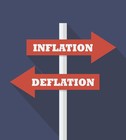Investors shouldn’t allow the short-term deflationary impact of Covid-19 to distract them from the likely return of inflation over the long term, says Royal London Asset Management’s Trevor Greetham.

Global markets have been in a disinflationary environment for much of the past decade, which has been highly supportive of the growth stocks which dominate the US market. By comparison, the FTSE 100 market is full of commodity and energy stocks which tend to do better when inflation is rising. The growth/value divergence has widened this year thanks to the deflationary shock of the coronavirus and the bias of growth to the tech sector, which has benefited from the economic lockdown.
“In fact, this year the UK market has underperformed the S&P 500 by more than 25 per cent, which is a huge number,” said Greetham, head of multi-asset at Royal London.
“It’s the biggest underperformance since the early 70s and you can see that it’s partly driven by earnings. The earnings trend has also been negative for the UK market because it has a big exposure to things like finance, leisure, resources and things that have done badly during Covid-19.”
Performance of indices YTD

Source: FE Analytics
The best performing asset class this year has been gilts, which tend to do well in deflationary situations, Greetham said.

Source: Royal London Asset Management
However, the UK inflation rate has seen a slight increase recently. Earlier this year the Bank of England predicted inflation would fall to nearly zero in 2020 due to the economic impact of the coronavirus pandemic. But according to the latest data from the Office for National Statistics (ONS), the consumer prices index (CPI) increased from 0.5 per cent in August to 0.7 per cent in September.
Greetham said that the outperformance of growth-oriented assets makes sense for now, but not over the long term. For example, he pointed out advanced economies have so far pumped fiscal stimulus equal to 10 per cent of GDP into the global economy.
“These are massive numbers,” the manager said. “There’s usually a lot of fuss made about a fiscal package of 1 or 2 per cent of GDP, this is 10.”
In addition, he pointed out banks are not pulling in loans like they did during the 2008 to 09 financial crisis because they have “these guarantees from governments, and you’re printing money”. 
“So the net effect is money supply is growing enormously,” the Greetham continued.
“And you’ve got to ask yourself with this stimulus, will it be left in the system for too long, and therefore will it become inflationary? We think there’s a good chance that it is left in the system for too long, because it’s going to be a brave government which announces Covid-19 is over and suddenly raises taxes.
“And central banks have started to move towards average inflation targeting and so [with] a period of deflation, they’re going to want to have a period of higher inflation later,” he added.
“This is why we think the bond markets in the UK are not pricing in above-average inflation and we think that the deflationary winners of 2020 will not necessarily be the winners over this future period.”
Turning to his own multi-asset portfolio, Greetham (pictured) explained some of the asset allocations he has made to help hedge against rising inflation.
He is overweight to commodities, but is underweight commercial property for now, even though he expects rents to rise in line with inflation. He predicted this asset class will start recovering in the middle of next year.
The impact of coronavirus on the high street has been significant, as people have turned to online shopping. But physical retailers make up a tiny portion of the average UK property portfolio, Greetham said, with high-street shops outside of London accounting for around 3 per cent of the MSCI UK Commercial Property index.
“Now we don’t know what will happen to offices, whether we’ll all go back, there are some question marks. And we are currently still underweight because we’ve got this extra period of shutdown to get through. But we do think that there’s value in property in the long run as you’d expect returns to be an inflation-matching proposition.
“We think a very broad, more diversified mixture will help people fight that inflation better than if they’re just in gilts and long-duration growth stocks,” Greetham concluded.
Greetham’s £182.3m Multi-Asset Strategies fund has lost 2.83 per cent since launch in November 2018, compared with gains of 8.89 per cent from its Bank Of England Sterling Overnight Index Average + 4% benchmark.
Performance of fund versus index since launch

Source: FE Analytics




